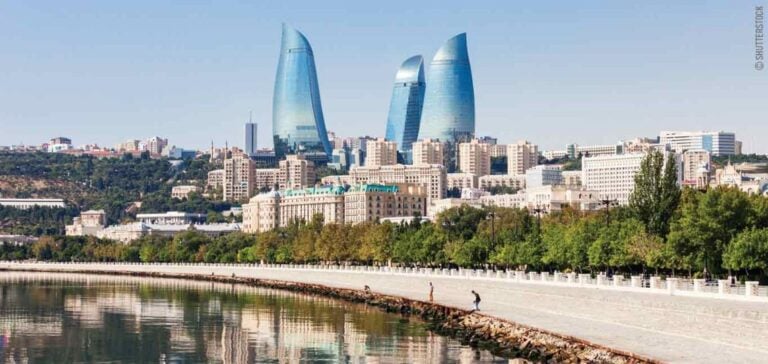At the heart of global discussions on energy and climate, the 29th Conference of the Parties (COP29) is being held this year in Baku, the capital of Azerbaijan. Known for its abundance of hydrocarbons, this Caucasian nation is a major player in the global oil and gas industry. Although calls for energy transition are increasing, Baku continues to champion natural gas as a pillar of this transition, seeking to meet Europe’s energy needs.
An industry rooted in oil extraction
The exploitation of natural resources in Azerbaijan dates back centuries. As early as the 13th century, Marco Polo mentioned a “source” of combustible oil in the region, while Zoroastrian temples, such as Atechgah near Baku, burned fires naturally fueled by underground gas emissions. In the 19th century, even before the first drilling in the United States, Azerbaijan drilled an oil well in 1846 in Baku, establishing the Apsheron Peninsula as one of the first modern centers of hydrocarbon production.
The late 19th century marked a significant expansion, notably with investments from Robert and Ludvig Nobel. They founded the Branobel company, which would become a world leader in oil before being nationalized in 1920 under Soviet control. By 1900, more than half of the world’s oil production came from this region. This golden era shaped a strong identity for Baku, which remains an important hub in the global energy industry.
A petrogas republic looking to the future
Since its independence in 1991, following the collapse of the Soviet Union, Azerbaijan has built an economy dominated by oil and gas. Currently, these resources account for around 90% of the country’s exports, half of its state revenue, and 35% of its gross domestic product, according to the International Energy Agency (IEA). In 2022, Azerbaijan produced 32.7 million tons of crude oil and 35 billion cubic meters of gas, with over two-thirds of these volumes intended for export.
The exploitation of the Azeri-Chirag-Gunashli (ACG) field in the Caspian Sea illustrates this dynamic. Located about 100 km from Baku, this site is operated by British company BP in partnership with the Azerbaijani state-owned company Socar. The ACG field alone supplies more than half of the country’s crude oil production, according to first-quarter 2024 operational figures.
Natural gas, a bet for the energy transition
With significant reserves and a favorable geopolitical position, Azerbaijan is preparing to increase its natural gas production capacity. According to the NGO Oil Change International, Baku aims to boost production by 14% by 2035. Although oil production peaked in 2010 and is in slight decline, gas production is on the rise, with the country viewing this resource as a crucial transition energy.
As a member of OPEC+, the expanded version of the Organization of Petroleum Exporting Countries, Azerbaijan aims to meet Europe’s growing demand for gas, a demand heightened by reduced Russian exports due to economic sanctions. To this end, the “Southern Gas Corridor” (SGC) connects Azerbaijan to Italy via Georgia and Turkey, a strategic axis that strengthens its role as a key supplier to Europe.
An opportunity for Europe and a challenge for the environment
For Europe, secure energy supply has become a crucial issue. With its export capacity and strategic access to the European market, Azerbaijan positions itself as a viable alternative to Russian gas. However, this increased reliance on hydrocarbons raises questions in a context where carbon neutrality goals are central to energy policies.
As COP29 opens a platform for dialogue on reducing global emissions, Baku’s strategy faces a dual challenge: contributing to European energy stability while participating in global transition efforts. By investing in natural gas, Azerbaijan highlights the complexities of energy transition for hydrocarbon-producing countries, a transition that must balance immediate needs with long-term objectives.






















